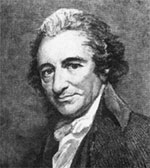

Temple's Diary
A Tale of Benjamin Franklin's Family
In the Days Leading up to The American Revolution
Our trip back to Philadelphia yesterday started off, to say the least, in a glum mood, about as somber as my arrival in Perth Amboy three months ago, and for the same reason. But now, obviously, there is very little hope left for a reconciliation. Grandfather looks miserable.
To cheer him up a little, I ask how many committees he now belongs to. It works. He shakes himself back to my presence.
— "Let's see, the committee to establish our own postal services, the committee to draw up a petition to the King — a useless one, believe me — the committee to study the means of starting up the manufacture of saltpeter (essential, that one), the one to draft General Washington's declaration of the causes for taking up arms, the committee to supervise the issuance of paper currency with authority over all the colonies.
— "Grandfather! Just listening to your list wears me out!"
— "Quiet, Temple. I'm just beginning. On July 3, I was made president of the committee of safety, the crucial one, created to procure arms and ammunition, appoint inspectors, select the proper site for a fort at Red Bank and prepare the defense of the river. We are beginning to build gunboats of two different types and our builders are so skillful that they can complete a gunboat in 16 days."
— "Is that the whole list of your committees?"
— "Of course not. It's an overwhelming task, building a country from scratch. I'm on a committee to insure the protection of American trade and on another one to supervise Indian affairs. Then we needed a committee to consider Lord North's so-called conciliatory resolution. The report rejecting it was adopted at the very end of July. Oh, I forgot to tell you that a few days before that, I was appointed postmaster general, the post that the English deprived me of, as you may remember."
— "Yes, I remember. After the Cockpit."
— "We have also created a committee to encourage the domestic manufacture of lead and our most recent one is the Philadelphia committee of inspection and observation."
— "What do they inspect and observe?"
— "They sit all day at the London Coffee House to watch the arrival of vessels and inspect their cargoes. I'm not a part of that one."
I was about to say "too bad, that one sounds like fun," but I did not want to sound flippant — not today — so I kept quiet.
— "Those are all the committees I can think of right now," concluded my grandfather, "but a few more are to be organized later in September — to supervise the importation of arms, to consider the state of American trade, and to confer with General Washington at his headquarters. I guess I'll be appointed to all of them."

Grandfather fell silent for a while and suddenly said: "Do you happen to remember Thomas Paine?"
— "Of course, the man with the piercing eyes who visited us back on Craven Street." I was tempted to add that Mrs. Stevenson and her cook had remarked among themselves that what the man needed above all else was a hot bath with plenty of soap, but I decided not to repeat that. I'm beginning to see that it is often a good idea to keep one's mouth shut. "What about him, Grandfather?"
— "Well, he is making quite a name for himself. He arrived in Philadelphia a few months before we did, you and I, and I believe he has finally found his voice in political journalism."
— "Meaning?"
— "Meaning that he has met a Scotsman, Robert Aitken, who started a journal called The Pennsylvania Magazine. Paine is contributing to it in his direct, forceful way, and the readership has gone up a lot since he joined."
I close my eyes and bring myself back to those happy days in London.
A strange bird, that Paine. He told us he was the son of a poor Quaker corset-maker. "A corset-maker, Sir?" I whispered. "Yes, sonny, a corset is some kind of torture undergarment, full of whalebones, that ladies wear to make themselves more shapely."
Paine was taken out of school at thirteen and apprenticed to his father's trade, but when he reached nineteen he shipped out on the privateer King of Prussia. I listened to his story, fascinated as he told us about his moving from town to town, making those famous corsets, working for the customs service, teaching school, running a tobacco store, eventually a grocery. He married twice during those wanderings; his first wife died and he eventually separated from the second one. No children. He was free. He always felt that, although he had received so little formal education, he could contribute something to the world if he had a chance. Finally he had made his way to London where he wanted to plead the cause of the customs officers whose pay was so low that they were inevitably open to bribery. A friend gave him a letter of introduction to Dr. Franklin.
The Doctor, who had listened to Paine most attentively, asked "Would you like to emigrate to the American colonies?" Yes, he would like nothing better was the answer.
Later, when we were at supper, Mrs. Stevenson asked , "What do you see in him?"
Dr. Franklin thought for a moment. "I see a brilliant mind and, more than that, I see a flame that will be smothered if he remains in this country but may burn bright if he settles in Pennsylvania. I'm planning to give him letters of introduction to my son and my son-in-law."
Mrs. Stevenson, who would rather defy God than disagree with Dr. Franklin, said: "Good idea."
